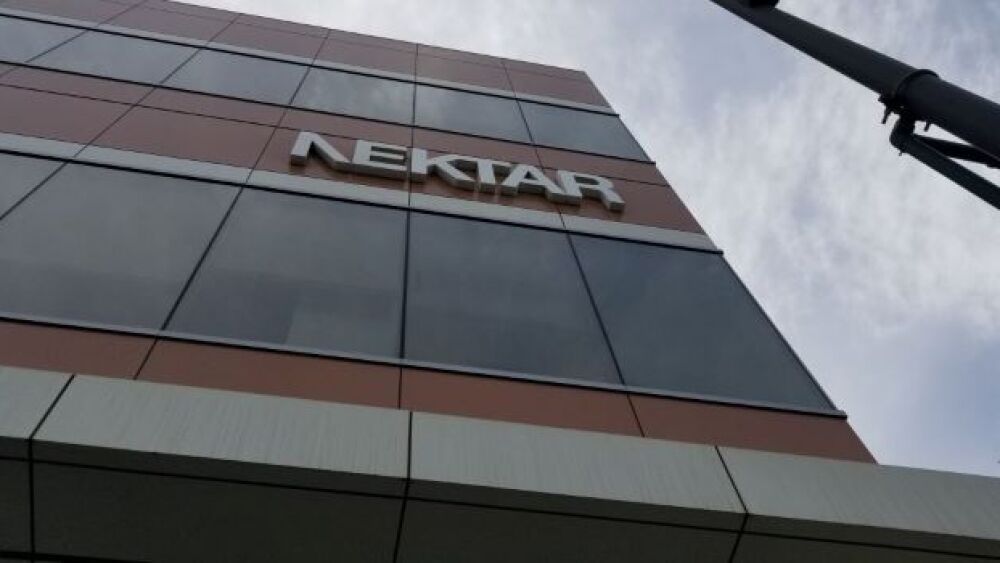Last week, rumors spread that PureTech Health was preparing to merge with Nektar Therapeutics. Now the deal, never officially announced, has been called off.
Smith Collection/Gado/Getty
Last week, rumors spread that PureTech Health was preparing to merge with Nektar Therapeutics. Now the deal, never officially announced, has been called off.
When the rumors first broke, PureTech released a statement on Oct. 6 confirming the two companies were in negotiations, but that they were “non-binding” and “there can be no certainty that any firm offer will be made, nor as to the terms of any such offer.”
Tuesday, in a K-6 filing and release, PureTech announced the two companies had agreed to terminate discussions.
Further, PureTech indicated the discussions had been very early, but under U.K. regulations, were required to be announced.
According to a statement from PureTech: “These discussions were early in nature and the required announcement created the impression that discussions were more advanced than they were. Given the early stage of the discussions and the potential for an extended period of uncertainty, these discussions were terminated.”
PureTech shares took a hit, plunging 21%, while Nektar’s dropped 4.3%.
PureTech leverages what it calls Founded Entities that focus on specific drug development programs. Its pipeline includes fibrotic and immunological diseases, difficult-to-treat cancers, lymphatic and gastrointestinal diseases and neurological and neuropsychological disorders.
Nektar focuses on therapies that selectively modulate the immune system to treat cancer, autoimmune disorders and chronic inflammatory diseases.
Allison Mead Talbot, PureTech’s head of communications, told BioSpace PureTech was not looking to be acquired.
“We regularly evaluate multiple ways to enhance value for our shareholders, including opportunities to further grow our pipeline and cash position,” she said.
Talbot said the company is “a financially robust and successful business with operational runway extending into Q1 2026 and $341.4 million as of June 30, 2022, with an addition of $115.4 million from the sale of KRTX [Karuna Therapeutics] shares in the post-period.”
The company also has a strong clinical track record, Talbot said, and its wholly owned pipeline and royalties and stakes in programs from its Founded Entities give it a strong financial foundation.
“Our board is confident in the existing prospects for PureTech, which are built upon a well-funded balance sheet and strong Wholly Owned Pipeline,” Talbot said.
The K-6 filing indicates PureTech remains in an “offer period” until the October 6th announcement expires. During that period, Nektar can either announce a firm plan to make an offer or announce it doesn’t plan to make an offer.
Nektar indicated it holds the right to make or participate in an offer within the next six months, if the PureTech board agrees and if circumstances “materially change.”
In April, Nektar described a strategic reorganization plan that included slashing 70% of its workforce. The announcement came weeks after Bristol Myers Squibb shuttered the two companies’ clinical collaboration program on bladder cancer and renal cell carcinoma.
The strategic plan had three pillars, as described on a conference call by Nektar Pres. and CEO Howard W. Robin.
The first was focusing on “value-enhancing data and other milestones with our key programs that can drive increased shareholder value over time.”
The second was to right-size the organization; the third, to ensure Nektar had sufficient capital in place through 2025.
Although the BMS decision was a blow, with Nektar shares crashing 24% at the news, the company still has ongoing partnerships with Eli Lilly, Merck KGaA, Darmstadt, Germany, Fred Hutchinson Cancer Center, MD Anderson Cancer Center and Stanford University School of Medicine.
The BMS decision came after disappointing results from two Phase III trials of Nektar’s bempegaldesleukin with BMS’s checkpoint inhibitor Opdivo for bladder cancer and renal cell carcinoma. Two earlier studies, Phase III PIVOT-IO-001 and Pivot-12 in melanoma were halted after unsatisfactory results.





